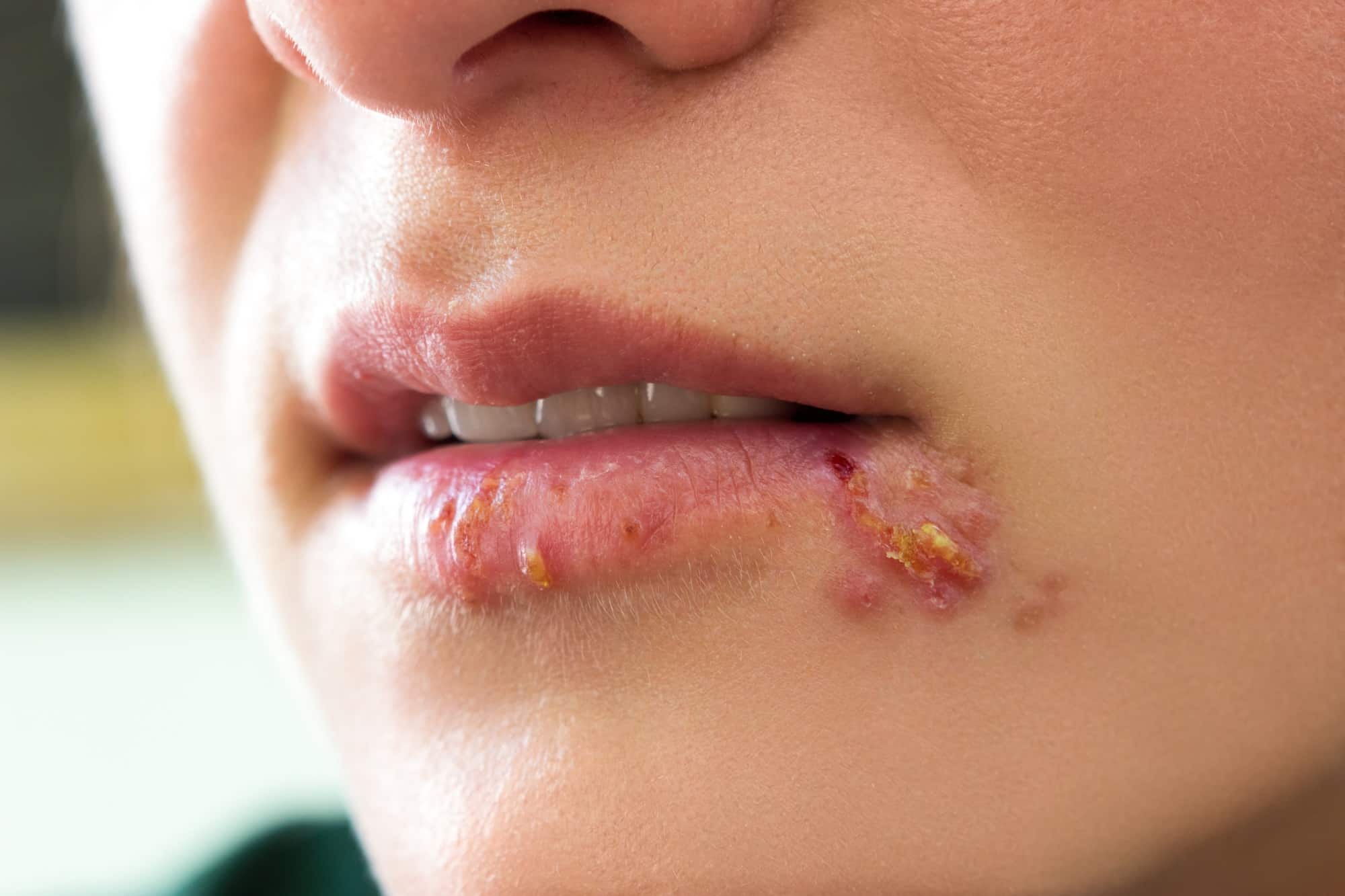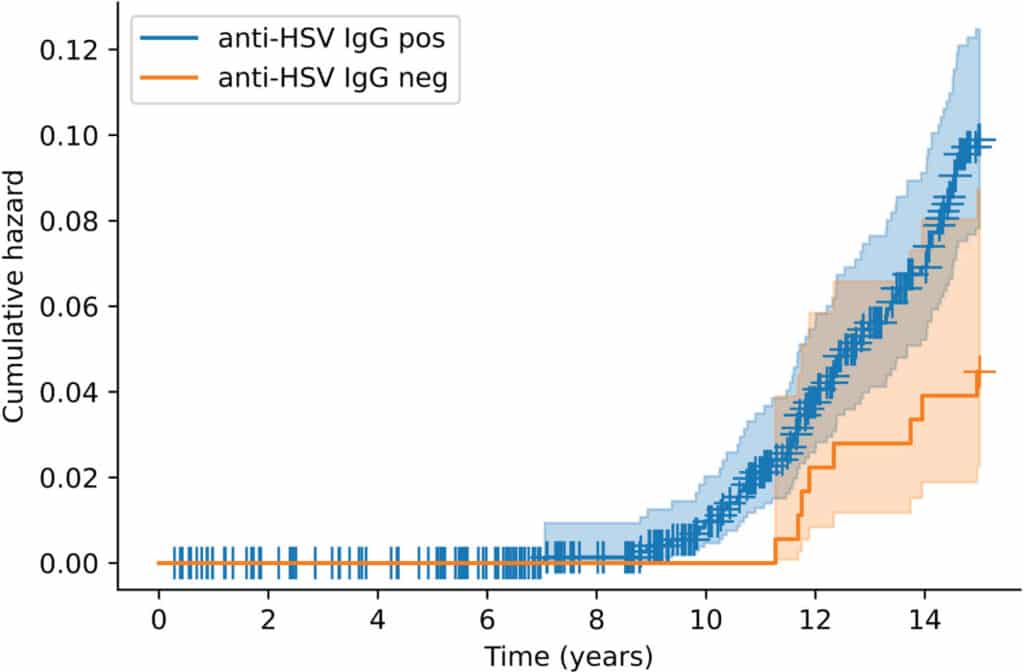Herpes virus infection doubles the risk of dementia

⇧ (video) You may also like this partner content
A study of nearly 1,000 people who have been infected with the virus Herpes simplex
(HSV) is twice as likely to develop dementia. This correlation would be linked only to the presence of anti-HSV antibodies and not to their amount in the body. These findings add to the growing argument for a link between the virus and dementia and could potentially pave the way for new prevention strategies.
Herpes is a very common infection that affects a large part of the world’s population. While the infection is usually asymptomatic, it is lifelong, and symptoms may come and go throughout life. Two viral species, HSV1 and HSV2 (collectively known as HSV), are associated with orofacial or labial (manifested by “cold sores”) and genital infections, respectively.
An estimated 3.7 billion (67%) people under the age of 50 worldwide are infected with HSV1, while 491 million (11%) are infected with HSV2. Although the etiology of dementia is not yet well established, increasing evidence points to the involvement of HSV and other viruses. However, studies devoted to it sometimes show conflicting results.
Conflicting results
A source of controversy in previous studies lies mainly in the detection of immunoglobulins G and M (IgG and IgM) associated with viral infection. IgM is the first antibody secreted by the immune system in response to exposure to a foreign body, while IgG is more specifically associated with bacteria and viruses. High levels of these antibodies indicate frequent reactivation of the infection.
Previous research has suggested that the risk of dementia or Alzheimer’s (the most common form of dementia) is associated with the presence of IgG and IgM as well as levels of anti-HSV IgG. HSV-1 is thought to be most closely associated with the risk of dementia. Additionally, a strong correlation was found between HSV infection and apolipoprotein E4 (APOE4) – a gene linked to Alzheimer’s. Virus infection has also been linked to a decline in cognitive performance. Other research has also shown that certain anti-HSV treatments reduced the risk of Alzheimer’s disease by 70% in people positive for anti-HSV-1 IgG.
However, other studies (particularly meta-analyses) have shown no association between the presence and levels of immunoglobulins and dementia, or any interaction effect between virus and the APOE4 gene, although mixed results regarding the ability of anti-HSV treatment to reduce risk for some are infected. People have acquired hysteria.
Recently, researchers from Uppsala University (in Sweden) proposed to end the debate by providing new strong evidence of the involvement of viruses in dementia. In particular, they believe that previous studies suggesting a lack of link may not have taken into account certain key variables, such as age — a key predictor of dementia prevalence. ” A feature of this study is that the participants are almost all of the same age, which makes the results more reliable, since age differences – associated with the development of dementia – can distort the results. », explains Erika Westin, lead author of the study from Uppsala University, in a press release.
An association with the presence (and not the level) of anti-HSV antibodies
New study – published in Journal of Alzheimer’s Disease – concerns 1002 Swedish people aged 70 years who did not initially present with dementia and who were followed for 15 years. Blood samples were collected for anti-HSV and anti-HSV-1 IgG, anti-cytomegalovirus (CMV) IgG, and anti-HSV and anti-CMV IgM. CMV is another herpes virus that has been studied for its association with dementia risk. Diagnostic data and drug prescriptions were collected from medical records.
During the study, 7% of participants developed dementia (all types) and 4% developed Alzheimer’s. Among these participants, 82% received anti-HSV IgG and 6% received antiviral treatment. The researchers thus calculated that people positive for anti-HSV IgG had twice the risk of developing dementia.

Cumulative risk of dementia based on anti-HSV IgG positivity. © Erica Westin et al.
However, no significant associations were found specifically for Alzheimer’s, although the hazard ratio (a measure of how often a certain event occurs in one group compared to another) was generally comparable for dementia. On the other hand, levels of anti-HSV IgM and anti-CMV IgG, as well as taking anti-HSV treatment, were not associated with dementia or Alzheimer’s risk, according to the results. Furthermore, there was no clear correlation between the prevalence of anti-HSV and anti-CMV IgG and the presence of APOE4.
See also

The researchers concluded that the presence (rather than levels) of anti-HSV IgG was positively associated with dementia risk. On the other hand, according to these results, CMV is not involved in the prevalence of dementia. ” It is exciting that the results confirm previous studies. Growing evidence is emerging from studies that, like our findings, point to herpes simplex virus as a risk factor for dementia. », estimates Westin.
However, experts noted that the low prevalence of Alzheimer’s may have reduced the statistical power to detect specific associations, not to mention that the study was only observational. Although their results suggest that the virus does not appear to interact with APOE4, additional research and randomized controlled trials will be needed to further explore potential correlations.
This will also help determine whether anti-HSV drugs can actually help prevent dementia. Potential vaccine strategies can also be studied. ” The findings could push dementia research to treat the disease early or prevent it before it occurs, using common anti-herpes drugs. », concludes Westin.





